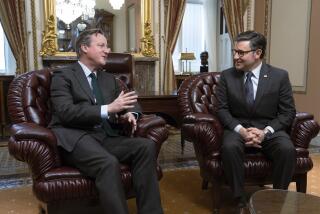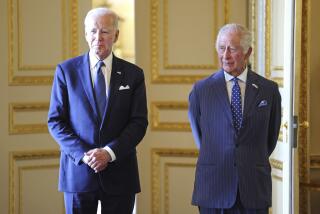Rift Mended After Major, Clinton Talk : Diplomacy: Leaders stress areas of agreement, including foreign policy, during Briton’s U.S. visit.
- Share via
WASHINGTON — President Clinton and British Prime Minister John Major, so estranged last month that Major refused to take Clinton’s telephone calls, patched up their feud over politics and personality Tuesday.
“Throughout this century, the United States and the United Kingdom have stood together on the great issues that have confronted our people,” Clinton, with Major at his side, said after their talks. “We have, as always, found much to agree about.”
“We’ve had the opportunity today for a good-humored, worthwhile, productive and very far-reaching series of exchanges on a whole range of matters,” Major responded.
Relations between the two men--strained from the start because Major seemed to support Clinton’s opponent, former President George Bush, in the 1992 election--got much worse last month after Clinton entertained Irish republican leader Gerry Adams at the White House.
The British government believes that Adams, head of Sinn Fein, the legal political wing of the outlawed Irish Republican Army, has not yet done enough to make peace in Northern Ireland to rate official hospitality in Washington. After the St. Patrick’s Day reception, Major was so angry that he would not return Clinton’s telephone calls, according to sources in both countries.
The atmosphere was not improved when Clinton announced that he will celebrate the 50th anniversary of the Allied victory over the Nazis next month in Moscow, sending Vice President Al Gore to another ceremony two days earlier in London. Moreover, Major arrived in Washington on Monday but was unable to meet the President until Tuesday because Clinton was in Little Rock, Ark., watching the Arkansas basketball team lose the national collegiate title game to UCLA in Seattle.
*
But all of the rough spots were gone by the time Clinton and Major faced reporters at the White House.
“The fact of the matter is that . . . we know one another well enough and the relationship is good enough to have those disagreements, and it doesn’t affect the broad swath of agreement that exists between the two countries,” Major said.
Clinton agreed: “I think we’ve got a good personal relationship, and I feel very comfortable about where it is and I think it’s honest and open and it endures occasional disagreements.”
When a British reporter said that Clinton’s Democratic Party is at the opposite end of the ideological spectrum from Major’s Conservative Party, the President replied: “I think that in foreign policy, the differences are not easily discernible by party.
“At the end of the Cold War in this country, and I sense throughout Europe perhaps, there are forces arguing for kind of an inward-looking approach . . . and there are others who believe we must still continue to broaden the frontiers of relationships, to expand trade in order to support democracy and prosperity. I am in that latter group, (and the) prime minister is in that latter group.”
At the joint news conference, Clinton also said the United States will renew its diplomatic efforts to persuade Russia to cancel a $1-billion sale of nuclear technology to Iran.
“Let’s don’t jump the gun,” Clinton said when asked about Moscow’s rejection Monday of the U.S. appeal. He said the United States will continue to raise the subject with Russia at every opportunity, including at his summit meeting next month with President Boris N. Yeltsin.
More to Read
Sign up for Essential California
The most important California stories and recommendations in your inbox every morning.
You may occasionally receive promotional content from the Los Angeles Times.










